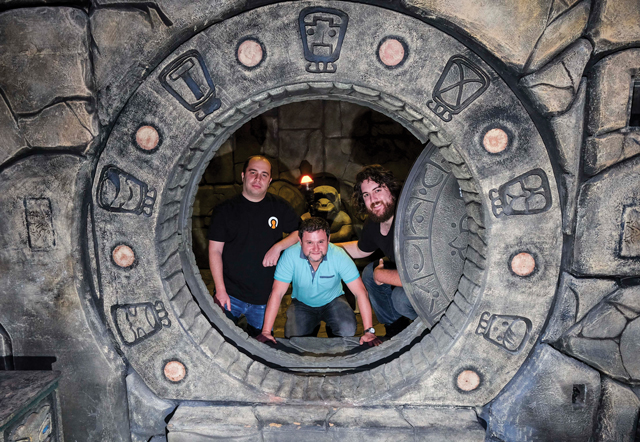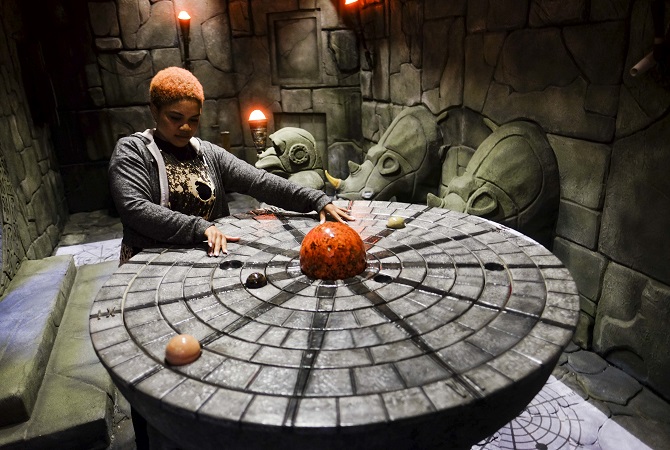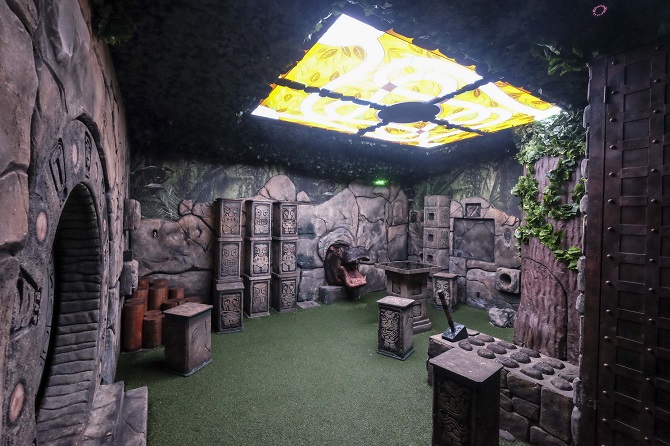
The release of a blockbuster movie is routinely attended by promotional efforts spearheaded by the film’s distributors, from merchandise to live interactive events.
Sometimes those events are held free of charge in hopes that they will inspire would-be fans to participate in some of the movie’s promotion in the form of social media.
Selfie with a space alien, anyone?
One relatively new form of interactive entertainment – so-called escape rooms, where groups have to solve a puzzle in an allotted time to “escape” a room – are flipping that financial script, however.
Studios aren’t funding the movie-themed rooms, though – that falls to the company offering the escape room experience, which might pay an additional license fee to the studio in exchange for the potential edge a hit movie might bring to efforts to lure fans.
What’s an escape room?
You’re not alone in wondering.
A recent New York Times article quotes estimates from escape room bloggers David and Lisa Spira, who reckon that the number of escape rooms in the U.S. has grown from 22 in 2014 to 2,000 in 2018, making the ventures a relatively nascent form of live entertainment.
The concept originated in Japan, and has gained popularity among millennials in U.S., where it remains something of a mystery to much of the rest of the population.
That’s why some escape room companies are willing to pay the price of licensing to piggyback on the popularity of a movie as a way to introduce newcomers to a different sort of entertainment.

Burgeoning business
60Out, a division of Hollywood-based Escape Key Entertainment Inc., recently added a “Jumanji: Welcome to the Jungle” escape room experience at its Melrose location in Hollywood.
The company, founded in 2015, offers 20 escape room experiences at seven locations, with trailing 12-month revenue of around $3 million. “Jumanji” is the company’s first movie-themed escape.
Escape Key Entertainment owner Ilya Vradiy said it is so far the most expensive, costing about $300,000 to script, build and design, compared with about $100,000 for most of the company’s escape rooms.
An hour in the escape room costs $38 per person Sundays through Thursdays, $40 per person on Fridays and Saturdays.
The “Jumanji” escape room opened last December, the same month Sony Pictures Studios Inc.’s “Jumanji: Welcome to the Jungle” hit theaters. The movie was an unexpected hit, and crossed into blockbuster stratosphere to become the movie studio’s highest grossing film of all time, reaching $404 million at the domestic box office.
Vradiy said he hopes that Sony or another movie studio might choose eventually decide to fund themed escape rooms as a marketing tool rather than charging a licensing fee, but for now the arrangement is worth the cost.
“We are still a very small company, (even though) we have doubled in size every year since we started,” Vradiy said. “People outside the bubble don’t know about escape rooms…this is way for everybody to connect with the experience.”
Vradiy said the Jumanji escape room has been grossing about twice as much as the company’s next-best performing escape room.
Damian Bosiacki, 60Out’s director of operations, said a movie theme can make a new experience palatable and fun.
Jamie Stevens, executive vice president of worldwide consumer products at Sony Pictures Entertainment, said escape rooms could provide an opportunity to create stronger fanship for a movie. This is Sony’s first escape room partnership.
“We are committed to working with best-in-class partners to develop groundbreaking experiences,” he said.
The executive stopped short of saying Sony plans to fund escape rooms as a marketing tool in the future, however.
“We’re open to exploring business models for new lines of business,” he said.
Sony and 60Out declined to specify how much the escape room company paid for the Jumanji license rights.

Alternate avenues
The Void, a Lindon, Utah-based virtual reality entertainment company with a satellite office in Glendale, opened an attraction with escape room elements at Glendale Galleria in mid-May based on the “Star Wars” movie franchise. The company would not comment on whether it paid a license fee to operate “The VOID’s Hyper Reality VR Star Wars Experience,” but said it was not designed to market any Star Wars movie.
“Today, we create immersive location-based experiences that expand stories from
some of Hollywood’s best storytellers,” Void Chief Executive Cliff Plumer said in an e-mail. “But our platform also allows for original content development for a variety of uses, like entertainment, education and beyond.”
Veteran film marketers say the jury is still out on whether escape rooms prove to be an important movie marketing tool in the future.
Thomas Grane, chief executive of entertainment marketing agency Mob Scene, located in mid-Wilshire, compared the marketing potential of a movie-themed escape room to other recent immersive experiences. Grane cited two recent promotional efforts for Warner Bros. Pictures Inc. blockbusters, “Ready Player One” and last year’s “IT,” based on the Stephen King novel.
On March 18, 10 days before the opening of “Ready Player One,” the studio launched the free-admission “Ready Player One Challenge: The Maze,” located in near Hollywood Blvd. and Vine St. in Hollywood.
And, last August, about a month before the opening of the studio’s supernatural horrorfest “IT,” Warner Bros. took over a 5,000-square-foot property, also at Hollywood and Vine, and converted it into the movie’s haunted Neibolt Street House.
“It’s fan-driven marketing,” Grane said. “It’s all motivated by social media, the drive to get as many people as possible to post to their Instagram, or their Snapchat. It’s the same reason entertainment properties will overspend on what they put together for (San Diego) Comic-Con.”
Craig Murray, chief executive of MOcean production company in Burbank, said, “I am personally not convinced the current popularity and growth of escape rooms nationwide can be maintained.”
He added the amount of buzz generated by escape rooms is by definition small because only a few people can fit into an escape room at any one time.
And even strong growth in spite of such limitations might not translate into marketing dollars for escape room providers.
“I think that history has proven that whenever studios can utilize OPM –Other People’s Money – to promote a film, they will happily do it,” he said. “I tend to believe that a studio’s escape room marketing partner would be expected to bear the brunt of the costs.”
